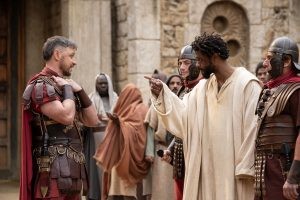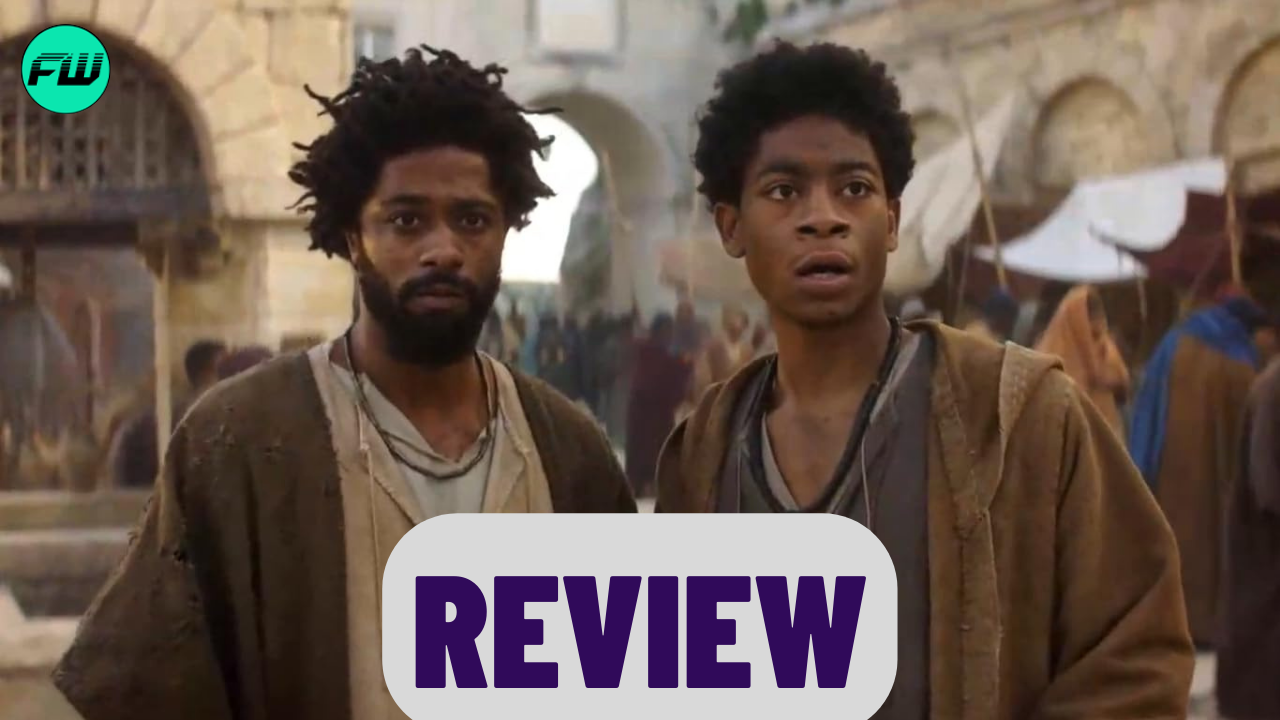There are many artists around the world. People with above-average talent in a specific area of their practiced art. Fewer are those who manage to transfer their talent to the various departments of, for example, cinema, and even fewer to multiple arts. Jeymes Samuel belongs to that impressive minority, and, after his directorial debut in The Harder They Fall, he’s now releasing his sophomore flick, The Book of Clarence, a biblical satire mixed with different genres and tones that deserves to be seen on the big screen!
Samuel rightfully mentioned that westerns and biblical epics were the blockbusters of the past. The director-screenwriter-producer-composer – we’ll see if he doesn’t get another title in the coming years – grew up precisely with these types of film, therefore, it makes perfect sense that his first movies originate from these genres. However, both The Harder They Fall and The Book of Clarence distinguish themselves from the rest of the more formulaic narratives. Samuel’s unique visual style and contemporary musical choices mark both films, but it’s the script that clearly stands out in the latter.
The Book of Clarence Critique

Also Read: Poor Things Venice Film Festival Review
Filled with thought-provoking parables and analogies with the most well-known stories and characters from the Bible, The Book of Clarence is one of those movies that “bite.” From the mostly Black cast – which will amusingly upset a certain group of viewers – to the total reconstruction or purposefully literal recreation of events that the world considers historical and true – miracles of Jesus Christ, his (re)birth, origin, and impact on society – Samuel demonstrates remarkable narrative creativity and fascinating attention to detail. Better than the conclusions of each satirical sequence are the extremely captivating build-ups, often causing audible laughter.
The general audience is blasted with entertainment throughout the entire runtime, but The Book of Clarence doesn’t exist just to amuse those who come looking for an enjoyable, light session. Samuel deeply explores his flawed protagonist, Clarence (LaKeith Stanfield), in a typical journey of self-discovery. In the case of Clarence, we find an ambitious, dreamy character, but without the confidence and, above all, faith to believe that he can really achieve what he wants for himself, as well as for his family and friends.
In a surprisingly personal battle between knowledge and faith, The Book of Clarence conveys a message that no concept is more powerful or important than the other, but rather complementary and essential for us to improve as capable, empathetic human beings. I haven’t watched all the films in which Stanfield (Judas and the Black Messiah) has participated during his career, but I hold no doubts that this is certainly one of the most complete, complex performances the actor has ever given.
In a dual role that I obviously won’t go into too much, Stanfield navigates the tricky tonal mix brilliantly, demonstrating not only genius comedic timing but an impressive ability to transform and deliver a weighty dramatic conversation on topics such as honor, justice, and hypocrisy. An actor capable of leading several genres… it’s a shame Stanfield isn’t offered more opportunities of this magnitude. That said, he’s also helped by a supporting cast equally deserving of endless praise.
RJ Cyler (Emergency) and Omar Sy (Jurassic World Dominion) play the protagonist’s companions, contributing significantly to the movie’s comedic layer, especially the former with his wonderfully humorous facial expressions. Anna Diop (Nanny) brings romance to the overarching story, Caleb McLaughlin (Stranger Things) continues his surprising career path with yet another intricate role, while James McAvoy (It Chapter Two) and Benedict Cumberbatch (The Power of the Dog) share little but extraordinary screen time. The last two are linked to characters with a lot of impact in the film’s conclusion, so I will remain silent.
In-location filming favors the atmosphere necessary for epic biblical tales, with Rob Hardy’s (Mission: Impossible – Fallout) cinematography making the most of the landscape of Matera, Italy – the city The Book of Clarence chose to represent Jerusalem – and of the visual effects complementary to the characters’ thoughts and the ongoing action. Still, Samuel’s soundtrack stands out. Using hip-hop in a movie set in 29 AD is, to say the least, strange and challenging to imagine how it can fit into this era…
The idea isn’t to force modern music into the past in a way that makes sense, but precisely to contrast that time, once again, in quite a hilarious manner. Expectedly, with so many different tones and genres, The Book of Clarence lacks better balance, especially in the abrupt transitions between the numerous storylines, each representing a different subgenre. The issue isn’t in the moments themselves, that is, the jokes remain funny, and the dramatic sequences still hold emotional weight.
But the constant tone shifting causes a distracting discordant feeling. Whether through musical choices, visual style, or the insertion of a lighter or comedic line of dialogue in more solemn times, The Book of Clarence‘s greatest attribute is somewhat inconsistent. The climax is a perfect example to verify this problem. Samuel recreates an excruciatingly long, harrowing, painful sequence that’s tough to watch, placing the previously highly entertained audience in complete silence, stuck deep into their seats without moving a muscle. The placement of a joke – efficient in itself – in the final phase of this last scene creates such a messy, jarring sensation that can be observed sparsely throughout the film.
Personally, there’s one more narrative detail that hundreds of other flicks have applied in the past, but I admit it’s one of my biggest pet peeves that I still continue to have immense difficulties in understanding its use. The Book of Clarence is one of those movies that begins with an opening shot depicting what will happen later in the film, usually in the third act. To date, the only cases in which this creative decision has been well-justified are movies that end up, in some way, deceiving viewers, messing with their expectations by showing an initial image without context, forcing a hasty conclusion far from the actual true ending.
This isn’t the case with The Book of Clarence, unfortunately. Not only does it confirm that the ending will, in fact, address a sequence that any viewer would anticipate after the first minutes, but it also shows a character that I firmly argue could never, ever have been present in this same opening. It only doesn’t completely ruin a late revelation that leaves everyone stunned because it remains incredibly funny. Honestly, if I have to show the movie to someone in the future, I will probably skip the first thirty seconds on purpose since these add nothing to the story and only detract from the viewing experience.
In Conclusion
The Book of Clarence certifies Jeymes Samuel as a do-it-all in filmmaking. Whether through his stylized direction, thought-provoking satirical screenplay, or bold soundtrack, the filmmaker once again delivers a highly original, genuinely hilarious blend of genres and tones, and a captivating spiritual exploration of the protagonist. Fortunate as well to have an absolutely superb cast with LaKeith Stanfield commanding the troops, delivering an impressively all-round performance. It lacks better tonal balance and more unpredictability, the latter being destroyed by an unnecessary opening sequence. Glad to know it will be released on the big screen, which is where I definitely recommend everyone to go and experience this piece of guaranteed entertainment.
7/10
Follow us for more entertainment coverage on Facebook, Twitter, Instagram, and YouTube.


